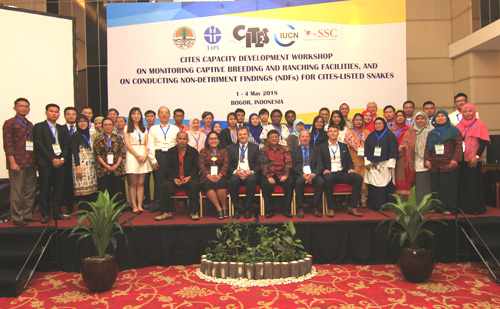 A training workshop on the application of new CITES guidance on trade in captive-raised animals was held in Bogor, Indonesia from 1 to 4 May 2018, bringing together 50 participants from 11 Asian countries representing national CITES authorities, as well as international experts.
A training workshop on the application of new CITES guidance on trade in captive-raised animals was held in Bogor, Indonesia from 1 to 4 May 2018, bringing together 50 participants from 11 Asian countries representing national CITES authorities, as well as international experts.
“Today, international trade in ‘wild’ animals and plants is in fact mainly in specimens from captive-raised or artificially propagated sources. The significant increase in this type of trade has given rise to concerns related to the control of the production and trade, and the consequences for the conservation of species in the wild, if management attention moves from in situ to ex situ,” says Tom De Meulenaer, Chief of Scientific Services of the CITES Secretariat. “We are actively working with Parties to help ensure that they can better meet their obligations under the Convention by developing guidance and providing necessary training.”
The guidance was used to assess legality, sustainability, and controls of facilities to ensure compliance with CITES – related provisions concerning captive breeding and ranching of a variety of southeast Asian animals and plants, ranging from large mammals, coloured snakes, to diminutive orchids.
“The workshop provided participants with the necessary knowledge to implement guidance on CITES source codes, captive breeding, and determining sustainable level of trade, developed at the request of the Parties to CITES” says Mathias Lörtscher, Chair of the CITES Animals Committee from Switzerland. “We note that the guidance supports key requirements for the implementation of the Convention.”
Specific guidance was provided and tested for ensuring that snakes captured from the wild are sustainably harvested and traded, and for controlling and monitoring snake captive-breeding facilities. Guidance materials were provided in 7 Southeast Asian languages, in addition to English.
Participants at the workshop were also given the opportunity to visit real-world facilities that breed and trade in CITES-listed species, and able to apply technical guidance produced in previous years.
After returning to their home countries, participants to the workshop will be able to use the training and capacity building tools to educate other CITES personnel and wildlife conservation stakeholders.
“This is the first training event in a series of workshops that will target the major trading regions for CITES-listed species around the globe. This first workshop in the series was highly successful thanks in particular to the efforts of the Indonesian Government and the engagement and lively interaction among participants from Asian countries”, added De Meulenaer.
Bangladesh, Cambodia, China, Indonesia, Laos, Malaysia, Myanmar, Philippines, Solomon Islands, Thailand, Viet Nam, the European Union, the Chair of the CITES Animals Committee, and the CITES Secretariat attended the workshop.
Indonesia was chosen as a venue for this first workshop as Asia represents the heartland of captive breeding efforts and trade in CITES-listed snakes, and Indonesia is an excellent source of best practices.
The International Union for Conservation of Nature (IUCN) provided invaluable technical and scientific input in support of the workshop.
The European Union and the United States provided generous funding support to workshop.
CITES Secretariat, 4 May 2018